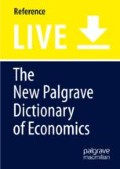Abstract
The Ricardian equivalence theorem states that government bonds and lump-sum taxes are equivalent means to finance government spending. Thus, a lump-sum tax cut financed by the issuance of one-year government bonds would not affect consumption. Consumers could hold the newly issued bonds, and use them to pay the higher taxes when the government increases taxes to repay the principal and interest on the bonds. Intergenerational altruism implies that Ricardian equivalence holds even if the recipients of a tax cut die before future taxes are increased to fully repay the bonds. This article explores situations where Ricardian equivalence does or does not hold.
This chapter was originally published in The New Palgrave Dictionary of Economics, 2nd edition, 2008. Edited by Steven N. Durlauf and Lawrence E. Blume
Bibliography
Abel, A. 1986. Capital accumulation and uncertain lifetimes with adverse selection. Econometrica 54: 1079–1097.
Abel, A. 1989. Birth, death and taxes. Journal of Public Economics 39: 1–15.
Bailey, M. 1971. National income and the price level. 2nd ed. New York: McGraw-Hill.
Barro, R. 1974. Are government bonds net wealth? Journal of Political Economy 82: 1095–1117.
Barsky, R., G. Mankiw, and S. Zeldes. 1986. Ricardian consumers with Keynesian propensities. American Economic Review 76: 676–691.
Bernheim, B., and K. Bagwell. 1988. Is everything neutral? Journal of Political Economy 96: 308–338.
Buchanan, J. 1958. Public principles of public debt. Homewood: Richard D. Irwin.
Buchanan, J. 1976. Barro on the Ricardian equivalence theorem. Journal of Political Economy 84: 337–342.
Carmichael, J. 1982. On Barro’s theorem and debt neutrality: The irrelevance of net wealth. American Economic Review 72: 202–213.
Chan, L. 1983. Uncertainty and the neutrality of government financing policy. Journal of Monetary Economics 11: 351–372.
Drazen, A. 1978. Government debt, human capital and bequests in a lifecycle model. Journal of Political Economy 86: 337–342.
Feldstein, M. 1976. Perceived wealth in bonds and social security: A comment. Journal of Political Economy 84: 331–336.
Patinkin, D. 1965. Money, interest and price. 2nd ed. New York: Harper and Row.
Ricardo, D. 1821. The principles of political economy and taxation, 1911. London: M. Dent and Sons.
Tobin, J. 1980. Asset accumulation and economic activity. Chicago: University of Chicago Press.
Weil, P. 1987. ‘Love thy children’: Reflections on the Barro debt neutrality theorem. Journal of Monetary Economics 19: 377–391.
Weil, P. 1989. Overlapping families of infinitely-lived agents. Journal of Public Economics 38: 183–198.
Author information
Authors and Affiliations
Editor information
Editors and Affiliations
Copyright information
© 2008 The Author(s)
About this entry
Cite this entry
Abel, A.B. (2008). Ricardian Equivalence Theorem. In: The New Palgrave Dictionary of Economics. Palgrave Macmillan, London. https://doi.org/10.1057/978-1-349-95121-5_1752-2
Download citation
DOI: https://doi.org/10.1057/978-1-349-95121-5_1752-2
Received:
Accepted:
Published:
Publisher Name: Palgrave Macmillan, London
Online ISBN: 978-1-349-95121-5
eBook Packages: Springer Reference Economics and FinanceReference Module Humanities and Social SciencesReference Module Business, Economics and Social Sciences
Publish with us
Chapter history
-
Latest
Ricardian Equivalence Theorem- Published:
- 16 March 2017
DOI: https://doi.org/10.1057/978-1-349-95121-5_1752-2
-
Original
Ricardian Equivalence Theorem- Published:
- 19 October 2016
DOI: https://doi.org/10.1057/978-1-349-95121-5_1752-1

